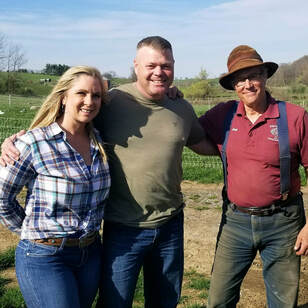
Polyface is a legend in the integrity farm and food movement. Started by the Salatin family in the 1960s, Polyface became an organic, food freedom and teaching hub - long before organic was even a cool buzzword.
Joel has authored over ten books, all aimed at helping turn the tide of the failed food and agriculture policy in the United States towards integrity, locally sourced small-farm success. His farm trains and equips the next generation of food freedom fighters on the East Coast.
Our goal is to become the same hub of inspiration and teaching on the West Coast. Stay tuned for exciting developments in the next few years.
Like Polyface, SonRise Ranch cattle are fed only grass - a stark contrast to the industrial farming method used to produce 90% of all beef.
Henry Ford is widely considered to have been the father of the assembly line method of production. With a predictable output and consistent product, his model "T" Ford became the first mass-produced automobile in history. This is a reductionist’s dream - defined inputs, predictability, and steady product. Who could ask for more?
The problem is, of course, that such a linear and parts-oriented approach works perfectly for any given mechanical object.
But not a biological one.
Cows were never created to be reared in a factory setting. They were never designed to be confined, to have consistent feed (called a TDR or "total daily ration") of measured corn day after day and never given freedom to roam on grass.
How would you feel if I trapped you behind bars and fed you only oatmeal for breakfast, lunch and dinner? Every day, each day, for your whole life - you never move more than 100 feet and eat the same thing no matter what.
In human vernacular, we call this "prison."
This creates disease, poor muscle structure, harmful pathogen explosion and a host of other issues. So we took the 2.5 hour drive from Alexandria, VA, to Swoope, VA, to visit the legendary Polyface. For hours we passed by civil war battlefields, picturesque plantation homes on hundreds of acres, marching routes of Washington’s revolution army. Each site basked brilliantly in the full bloom of a remarkable spring day in the Shenandoah Valley. Rural Virginia is nothing like the West Coast. At nearly twice the annual rainfall of our brittle environment in San Diego County, water is both prolific and abundant. Flowing water is everywhere. Streams, beavers, dams. Farms are ubiquitous. The majority of restaurants are some variation of Farm-to-Table, and I don't mean in name only. They really are directly supplied by a farm. Polyface alone supplies over 30 of them.
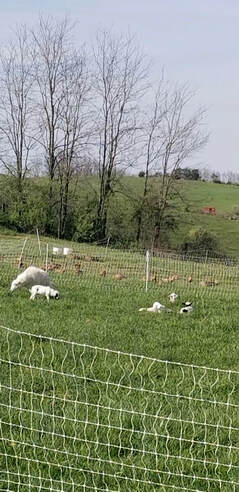 Typical scene at Polyface Farm, Swoope, VA.
Typical scene at Polyface Farm, Swoope, VA. As we approached Polyface in our awesome and formidable compact rental car, Eve and I both commented at nearly the exact time - Where are the rotational graziers? Where are the temporary electric fences, Cows groped in small compact grazing structures that cause perennial grasses to proliferate and grow in abundance (all the while sequestering 15% more carbon than unmanaged, continual, dispersed cattle on pasture)? Where are all the pastured chickens?
The hours soon gave way to minutes on the GPS estimate time for arrival. By now for sure, there would be plenty of farms and ranches (we call them ranches on the West Coast, back east they call them farms) that replicated, modified and repeated Joel's practices.
I mean, really folks, here you are within a stone’s throw of the father of the environmentally friendly land stewardship movement of the 20th century and you’re running a confinement, factory chicken house with 35,000 hens living on top of each other and a manure lagoon to catch waste runoff!
To set an accurate context here, you must understand that Polyface is the Jerusalem of the clean food movement. Joel has been featured in numerous books, movies, and high profile articles. He is sought by theologians and earth lovers alike. His methods have been replicated across thousands of farms in the United States. The day we stopped by, he had just returned from a two-week speaking tour in Australia. His influence in our ranching methods alone has been legendary.
As we turned the final left onto Polyface’s drive, we passed a confinement dairy with perhaps 1500 cows. The bare land erosion was stifling. Cattle left to pasture, with no management or rotation, had denuded the grass to zero.
Zero - really... nothing was left. Precious topsoil was eroding downstream.
For over two hours, our senses were bombarded with poor land management. We were acutely aware of the lack of eco-friendly farming surrounding Polyface. It was astonishing. When we finally arrive on Joel's farm we exhaled with a deep sigh of "finally." His farm was teeming with life, from bugs to chickens. Life was everywhere, the grass was the deepest and most vibrant I had seen yet.
I guess the light shines brightest in the dark. The contrast was palpable.
With neat, orderly equipment placed as we would on our ranch, it was readily apparent that this was a working farm. We were just two of 15,000 annual visitors from nearly 20 different countries. The nearest gas station is a substantial distance, groceries are even further, and we hadn’t seen more than a few vehicles in the last 20 minutes. The farm is remote by any standard. The hum of activity and birds chirping greeted us as we exited our car and headed for the Farm Store.
Following a brief visit to the farm store, we ventured out. Walking out past the car, I spotted Joel from a few hundred feet.
“Joel” – I shouted, as he turned and walked towards us. “We’ve come all the way from California to see you!”
“Well that’s great,” he replied in his quintessential southern drawl. After a short introduction, we explained, rather quickly, the impetus for starting our ranch. Eve’s autoimmune disease and the dearth of valuable, righteously cultivated, local foods. We told him of the inspiration he provided us when we first viewed FOOD INC, and of reading his books feverishly, so as to boot-strap our fledgling business into what SonRise is today.
After the monolog, I embarrassingly stammered out, “Sorry, I am probability keeping you from work.” He was fixated on our story, as if we were the only ones around that day. It was humbling, to say the least - he kept asking engaging questions.
“Actually, we’re filming a documentary here today,” gesturing towards the film crew that had been listening intently. “Why don’t you jump in the back of my truck and join us?”
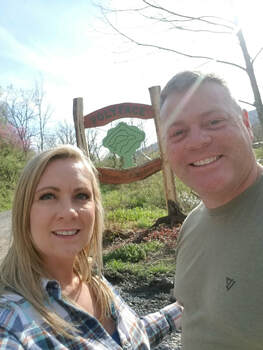 Doug and Eve Lindamood at the entrance to Polyface Farm, Swoope, VA.
Doug and Eve Lindamood at the entrance to Polyface Farm, Swoope, VA.
What I hadn’t known, until later, was that Joel had only hours before disembarked from a 25-hour flight from Australia, a nation in desperate need of his counsel. He had been there for two weeks on a speaking tour. This film crew had booked their appointment four months in advance, and he was gracious enough to include an entire afternoon of his time with us.
I was stunned.
I soon learned that we held the same philosophy with respect to people and the leading of our hearts for our constituency. In a later conversation, I found him agreeing with me when I quipped that as integrity farmers our “greatest ability is availability” – a saying I am fond of teaching each person in our employ. Our people need answers, they need to be heard, and they need someone to take the time to focus on them, even if just for a moment, to see them through this difficult process of finding a food shed for their sustenance and healing.
Joel and I had a kindred spirit. For both of us, this was more than land stewardship, animal care and environmental engagement - it was a calling.
The day meandered on. Our conversation was rich and diverse. We shared our dreams with him. He offered only encouragement and insight. I don’t recall even a word of caution. His zeal for a food-freedom world and farms that honor creation was astonishing. In a short afternoon, we bonded. As Eve and I left, Joel jumped on a four-wheeler and made his way to a pasture with cows in it. He was checking the mineral lick for the cattle as we passed him in our car. We waved, he waved. After hours on a plane, hours of interviews, deep, thoughtful, meaningful conversation - his respite was to go check on the cows.
Kindred spirits indeed.
We reluctantly started the long journey back. Inspired and motivated, the same countryside greeted us in our return trip. This time I saw it differently. I was not saddened by the lack of regenerative and sustainable posture of the neighboring farms; Eve and I were too busy discussing the renewed hope and enthusiasm we had for SonRise. It may be true that no prophet is accepted in his hometown, but when you are the one who encountered the prophet – it doesn’t really matter.
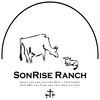
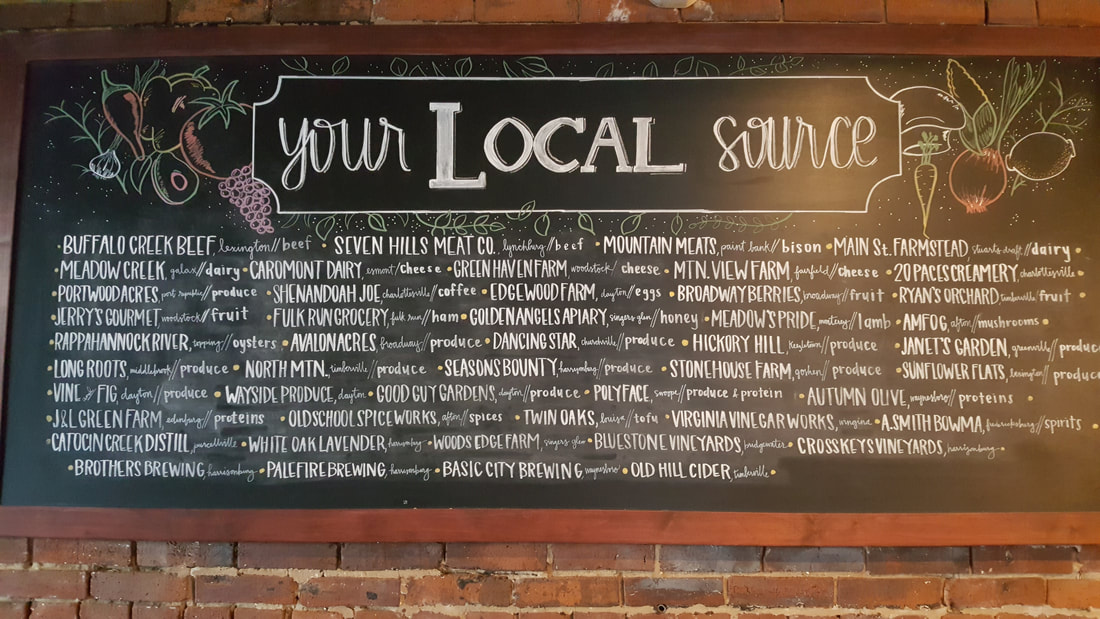
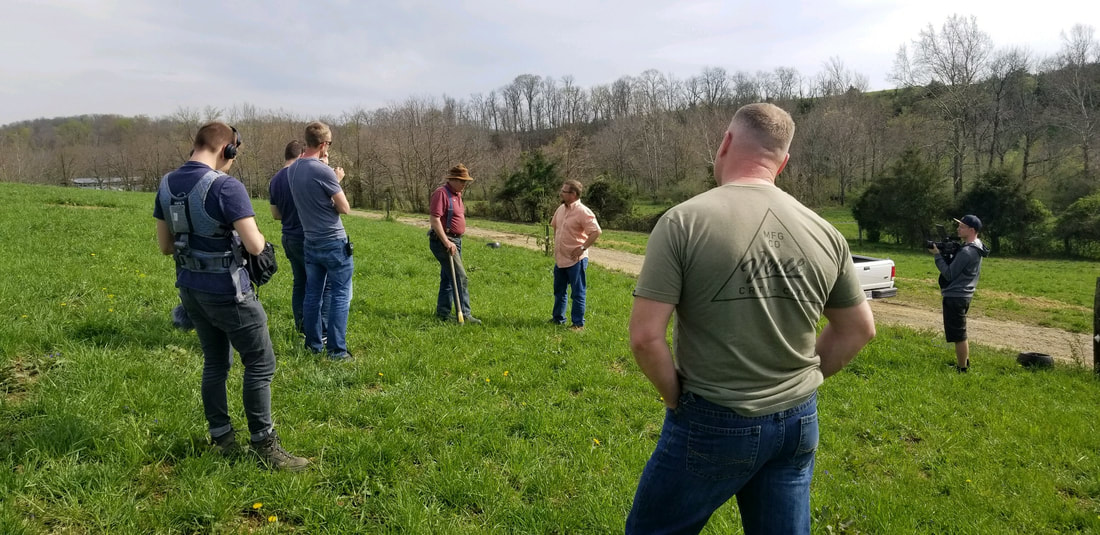
 RSS Feed
RSS Feed